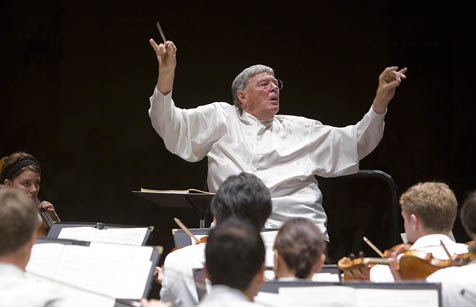The Academy Festival Orchestra, with Jeffrey Tate, conductor.
At the Lobero Theatre, Saturday, July 14.

How do you perform the Mona Lisa in concert? Jeffrey Tate and the Academy Festival Orchestra, magnificently arrayed in white on the Lobero stage Saturday night, faced a problem nearly that difficult-how to perform Beethoven’s Fifth Symphony, the most familiar work of symphonic music in history. Their solution was simple: They gave it as courageous and direct an interpretation as its composer would have wanted.
Tate conducted the famous opening motif with a big, silent downbeat, establishing a fast tempo with the three pick-up notes and never letting up, yet never rushing. New insights emerged at almost every turn. In the first movement, Tate brought out interesting inner voices in the exposition, clever juxtapositions in the development, and a sharp, crisp ending that eludes most conductors. The graceful second movement reminded us of how much Brahms owes Beethoven-the Fifth‘s graceful theme and its many contrapuntal variations gave Brahms the blueprint for his First and Fourth symphonies, at the very least. The final two movements complete Beethoven’s heroic-era trajectory of conflict, transcendence, and triumph; the Academy Festival Orchestra understood this narrative and revealed it to us with grace and flair.
After the intermission, Tate and the Academy Festival Orchestra played a very different Fifth: Sibelius’s Fifth Symphony in E-flat Major, Op. 82. Like its predecessor, this Fifth shows us challenges overcome by heroic action; unlike its predecessor, it puts the complexities of its content ahead of clear formal construction. Sibelius himself said that the symphony came to him as if “God the Father had thrown down pieces of a mosaic from the floor of heaven and asked me to work out the pattern,” leaving open the question of whether this creation matched the divine original. Tate took each piece of the mosaic and laid it down with care, and gradually, the enormous pattern emerged. The confusion and despair Sibelius saw in the Europe of 1916 gave way to a confident horn melody, and the winds of history swept away doubt.
As the crisp final chords of the work sounded, we heard the echoes of an entire tumultuous century ringing in our ears. Tate and the Academy Festival Orchestra gave us a profound evening and should be congratulated on their courage.



